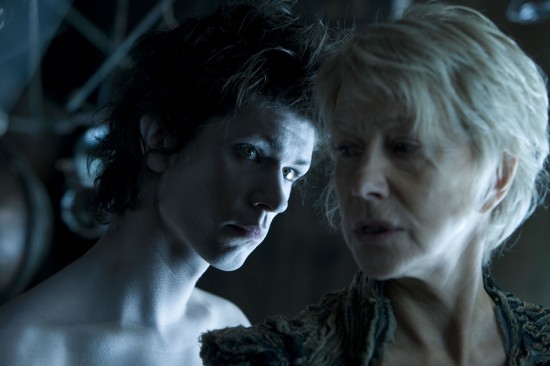Sometimes the random coincidences of the movie distribution business couple films that would otherwise seem unlikely bedfellows, yet somehow emerge in close conversation between the walls of the Cineplex. And while it is easy to make too much of thematic relationships and visual associations between films that are not intended to be related, it is hard to resist delving into the unexpected diptych created by the simultaneous release of Julie Taymor’s The Tempest and Joseph Kosinski’s Tron: Legacy.
To start, both films feel like mummified unearthings from the fringes of the 1980s – one intentionally so, and the other not as much. Tron: Legacy hits IMAX screens around the area with its funky nostalgia for an early digital age, as much an homage as a sequel to the revolutionary 1982 computer cult film that stared a young Jeff Bridges as a programmer who is sucked into his own program, battling it out with bad guys of his own creation in the world inside a machine. The new Tron has received many technological updates, but its mythic world still indulges in vintage-80s style – from jumpsuits and neon to gallery-white apartments – while cherry-picking moods from some of those wonderful apocalyptic films of the Reagan decade, like Dune or Mad Max.

Likewise, in terms of mood and style, Julie Taymor’s The Tempest has less to do with Lawrence Olivier and Kenneth Branagh than it does with Labyrinth, The Never Ending Story, and Time Bandits. David Bowie doesn’t make a cameo in Taymor’s Shakespearean adaption (regrettably), but Ben Whishaw delivers an adequate impersonation of the rock star with his curiously androgynous Ariel, a spirit character pulled from the cover of “Aladdin Sane.” Like Bowie, Whishaw undergoes a continual (and confusing) sexual metamorphosis throughout the film, occasionally appearing with female breasts, only to reappear as a bare-chested young male a moment later.
These sexual in-betweens seem dear to Taymor’s reimagining of The Tempest, the other gender play, of course, being casting Helen Mirren as Prospero (or Prospera, as it were). Taymor’s sexual stylings, however, do little to serve Shakespeare’s play. There is no gender punning with Mirren’s Propsero, whose motherliness flattens-out some of the dynamism of the bard’s character, the magician father whose power on stage has much to gain from the juxtaposition of his tender fathering of Miranda, and his harsher enslavement of Ariel and Caliban. Call it a sign of feminist victory, but Mirren’s mothering is natural and her power and guile as the magician-artist, pulling the puppet strings of power on the Italian peninsula, seems little more than an extension of the steadfast resoluteness that made her so memorable as Queen Elizabeth II in The Queen. In fact, those unfamiliar with Shakespeare’s play may come out of this new version believing that Prospero was always meant to be a female character.

Ironically, it is Jeff Bridges who emerges as the better Prospero as Tron’s Kevin Flynn. Like Shakespeare’s character, Flynn is in exile (albeit in a computer and not an island), and he is both a master and victim of his own craft. Also like Prospero, the duality of the craftsman-artist Flynn – his baser and more inspired selves, his Apollonian and Dionysian halves – is manifested in the two characters with whom he must contend. Flynn’s Ariel is Tron, a super hero from his video game who once fought at his side, but is now corrupted by the evil Clu. Clu, a Caliban of sorts as well as an Antonio, is a cloned version of Flynn, brutal and hell-bent on whipping the world of the “grid” (the name of the computer generated cosmos of Flynn’s creation) into ethnic perfection. As a result, Flynn is exiled from his own exile, fleeing the “grid” to an even more isolated craggy cave on the outskirts of his digital world.
In The Tempest, the king and his men arrive on Prospero’s island where they eventually meet the magician and his (her) daughter. In Tron, it is Flynn’s son who is sucked into the computer world, and he pushes his father to use his power to right the world of the “grid” and escape back to the real world. Bridges’ Flynn is a finicky hero, fearful of being used by Clu to completely subjugate the world of the “grid” and lost to years of Zen mediation that have fostered an internal peace and placidity in the formerly ambitious megalomaniac (as a semi-Buddhist, Bridges even humors us with some “Dude”-like lines a la The Big Lebowski).

Unlike Mirren, Flynn is more vulnerable to his human shortcomings, more affected by the confrontation with the darker corners of his own soul that manifest themselves in his craft. Perhaps because Mirren is playing to feminine ideals, making an argument about female power, she never lets her guard down, moving along the judicial action of Shakespeare’s play methodically. Bridges’ Flynn smacks of Prospero, but it is a character re-imagined by way of Goethe’s Dr. Faust. If fact, Tron is remarkably Neo-Romantic, with Flynn as its anti-hero, the conjuror of scientific power that unlocks a desire for godliness, pushing rational man into regions beyond science and into metaphysical mysticism. Flynn is a relenting superman, a man-creator who confronts his humanness and limitations by way of the shortcomings of his creation, namely its idealism. Somehow, Jeff Bridges’ “Dude-like” Flynn takes the figure of Prospero, runs him through Goethe’s Faust, and comes out with a figure who is akin to what Frederick Schiller spoke of as the dynamism of human nature: that innate pursuit of divine equality by way of aesthetic idealism.
What is curious (though not necessarily surprising) is that these latent fears about man’s unchecked technological power continue to resonate with contemporary audiences. They are, after all, concerns as old as the Promethean flame. It is also interesting to note that Shakespeare’s The Tempest was written in the same decade as Christopher Marlowe’s Dr. Faustus was published (albeit posthumously) – the two late-Renaissance men considering the trajectory of changing views on mankind’s nature and place in the cosmos.
We live at a time not only far flung from the worlds of those two authors, but also the early-computer age that inspired Steve Linsberger’s Tron. And yet we don’t need to stretch our imaginations too much to recognize metaphoric parallels between the world of Tron and our own. Many of us now live parallel lives by way of our computers – our Facebook and Twitter personae, perhaps an avatar in Second Life
And so it is interesting that these two fictions, Tron and The Tempest, not only embrace the apocalyptic undertones that characterized the style and mood of many fantasy films of the 1980s, but that they both conclude with a similar warning about the place of science, craft, and magic in human existence. In both, the craftsman/woman lays down his/her craft: Prospero’s staff tossed into the sea, Flynn self-sacrificial demolition of the portal between the real and computer worlds. In that way, both movies (though mediocre and flawed in their own way) offer commentary on own contemporary neo-Romantic heroes – from Julian Assange to Mark Zuckerberg – highlighting an unnatural idealism that is the rational trajectory of the Promethean urge.





